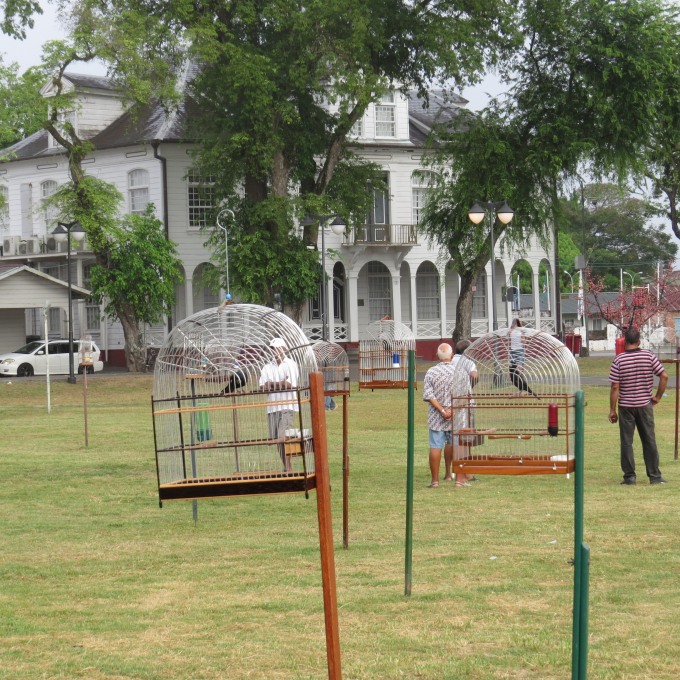Bird Singing - Parbo's Unusual Pastime
/It's early... just before 7am on Sunday morning and the coolest it will be all day in Paramaribo. Church bells chime in the distance. The grass on Independence Square glistens, still wet with dew. The Presidential Palace and the clock tower of the Ministry of Finance building stand as prominent sentries overlooking the park. Men begin arriving on foot, in cars, trucks, SUVs, vans, HumVees, motorcycles, and mopeds. They're well-dressed businessmen in casual clothes or burly, tough-looking guys with scruffy t-shirts and their baseball hats on backwards or just regular looking fellows … all with one thing in common … they're all carrying little birds in cages. We rose extra early to be here to witness Paramaribo's most unusual pastime … a bird singing competition.

We'd noticed that men regularly walk around with their caged birds. Bird cages frequently hang outside shops and a birdseed stall was always busy in the fresh market. We didn't realize it was quite as competitive as it is. We were unable to ascertain the origins of the bird-singing competition or why it has become so popular in Suriname. Some say it was brought to Suriname in the early 20th century by Chinese immigrants; others say it comes from the jungle. We were told that similar competitions occur in Belgium. The formal contests here were established in the 1950s. There is now a league of 17 bird-singing clubs in the Paramaribo area and they all compete regularly.
This is a man's sport; few women participate. In some places, guys get up early to go fishing or to play golf. Here in Paramaribo, they display their birds and coax them to sing. We'd read about the competitions, but found it hard to gather specific information. After milling around a bit and asking questions of other onlookers, we found out that today was not an actual competition. It was a training session, but we were content to watch anyway.
Men of the Suriname Whistling Birds' League greeted each other cordially as they walked onto the green and chose places to stick in stakes that would support the bird cages. Some men had one bird; others had two or three. They hung the cages near other birds and the birdsong became increasingly louder. It's a territorial thing. Sometimes they use a favorite female to get the males in the mood.
Have a listen...
Though it wasn't a competition day, I researched what a contest entailed. It involves birds competing in pairs to see which can sing the most melodies in 15 minutes. A "melody" is a sequence that includes at least two tones. Two bird cages are placed 18” apart in the middle of the green. Next to each cage stands a referee at a chalkboard . The clock starts and the referees lean in to concentrate on the birds' songs. What sounds to the untrained ear like twittering is in actuality, a series of well-defined songs. Every few seconds a stroke is added to the tally as each referee identifies a melody. In an average round, we're told a good bird will sing between 100 to 115 melodies.
Most of the birds come from the rain forests, purchased from AmerIndians or captured by the trainers themselves. The competing birds are all male. Their owners work diligently to teach them new, complex songs. Teaching is done by whistling new songs to the birds, an arduous process that requires at least two hours of daily effort.. The owners constantly play CDs for their songbirds to aid in the learning process. The tiny black picolet or the twatwa, a canary-size brown bird, are typical choices and they can be sold for as much as $3,000 each.
After an hour or so, the men collected their birds and began to wander off. We went searching for a cup of coffee. Enough excitement for a Sunday morning in Paramaribo.






